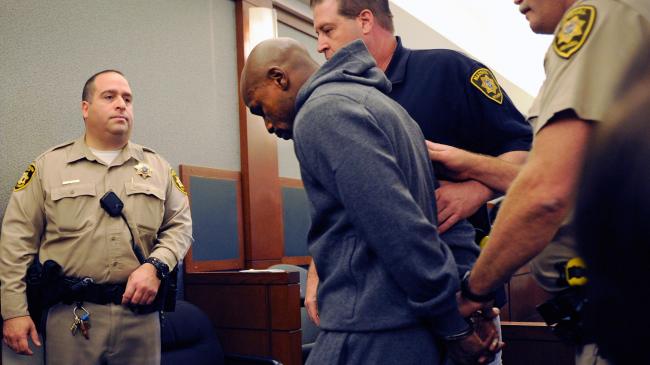
According to Francis McCabe of the Las Vegas Review Journal, it appears that undefeated superstar Floyd Mayweather Jr. is looking to serve the remainder of his 90-day jail sentence under house arrest.
Twelve days into his three-month jail sentence on a domestic battery count, undefeated champion boxer Floyd Mayweather Jr. is asking to go home.
Or he contends he may never fight again.
An emergency motion obtained by the Las Vegas Review-Journal shows Floyd Mayweather’s lawyers will ask Las Vegas Justice of the Peace Melissa Saragosa as early as today that the former Olympic bronze medal winner be allowed to serve the remainder of his sentence on house arrest.
The 35-year-old’s physical conditioning is deteriorating under the stress of being jailed at the Clark County Detention Center, and he is being held in “inhumane conditions,” lawyer Richard Wright said in the motion filed Monday.
The boxer is being segregated from the general population and confined to his cell 23 hours a day in a locked-down section populated by felony defendants, Wright said. And in the hour each day Mayweather is allowed in a recreation area, he is alone and unable to use training facilities.
Wright stated that others who have committed similar misdemeanor offenses are treated differently and Mayweather’s celebrity status “cannot be accommodated at the CCDC.”
Prosecutors are expected to oppose the motion. Jail officials were not available for comment late Monday.
Mayweather was sentenced to the 90-day jail stint after pleading guilty for beating his ex-girlfriend in front of their children in September 2010. He began serving his sentence June 1. Las Vegas police have maintained that Mayweather would be held in isolation to protect him from other prisoners.
The 35-page motion, which included affidavits from Mayweather’s co-manager, Leonard Ellerbe, and personal physician Dr. Robert Voy, stated that if Mayweather remained in jail, it would threaten his career. He had planned on fighting for at least two more years, according to the motion.
Voy, through a court order, examined the boxer for 90 minutes on Friday, while jail medical staff observed.
“Medical opinion shows that CCDC administrative segregation threatens to end or shorten Mr. Mayweather’s boxing career,” the motion said.
Voy determined Mayweather is consuming less than 800 calories a day. He is eating fruit, bread and energy bars bought at the commissary. Under his normal daily training routine the boxer consumes between 3,000 and 4,000 calories.
Voy also investigated Mayweather’s ability to exercise. He found Mayweather has no room to exercise in jail, and he is not allowed to use the training areas because he is in isolation.
“After examining Mr. Mayweather, Dr. Voy was concerned with Mr. Mayweather’s dehydrated appearance, his lack of muscle tone and his dry mucus membranes,” the motion said.
Voy also “expressed deep concern for Mr. Mayweather’s health and explained that any lengthy period of time with an inappropriate diet, coupled with lack of regular exercise, will most likely lead to irreversible damage to Mr. Mayweather’s physique,” the motion said.
“Such damage could and, most likely, would lead to Mr. Mayweather being unable to continue his boxing career,” the motion said.
Voy was concerned that Mayweather was withdrawing into depression and developing anger issues that he normally can “dissipate” through his exercise routine.
Wright identified several differences between the way Mayweather is treated versus those in general population.
Mayweather is allowed access to shower, watch TV, use hot water to prepare food, use phones and exercise for an hour a day. Other inmates have access to phones and TV, can play games with other inmates and are out of their cells “for most of the day.”
Inside his cell, Mayweather doesn’t have access to hot water to prepare food for himself or clean himself, and he was recently told he cannot receive bottled water because he is in isolation.
According to the motion, Mayweather has not been a problem inmate and has treated jail staff with respect. Still, “he (Mayweather) believes he is treated in a very unfair and inhumane way,” Voy said in the motion.
In Ellerbe’s affidavit, the trainer attested to Mayweather’s vigorous training regimen. Ellerbe said he has to “force him to leave the gym each day.” And it is this dedication to training that has allowed Mayweather to remain undefeated, Ellerbe said.
“Whether Mr. Mayweather will be able to box again is dependent on his continued conditioning,” the motion said.
Wright added in the motion, “To lose his physique and ability to box because of being placed in administrative segregation is a blow he should not have to take.”
That Mayweather is being held in isolation and not able to maintain his training regime “may cause, not just huge financial harm to Mayweather, but also huge emotional harm if he is no longer able to pursue his boxing career because of the de-conditioning he has suffered .”
Wright said that Mayweather believed he was only going to be in isolation for a week before being moved to another area of the downtown jail. Wright said jail officials have indicated he will remain in isolation. His scheduled release date is Aug. 3, according to jail records.
Wright said in the motion that Mayweather would be willing to work with jail officials to find “an appropriate location” to serve house arrest if the judge agreed. It’s unclear whether the appropriate location would be Mayweather’s 12,000-square-foot mansion in the ritzy Southern Highlands development. The mansion sports a walk-in closet bigger than his jail cell.
Mayweather has asked to be put in the general population, according to the motion, but jailers have declined to do so because of his celebrity status.
An emergency hearing on the motion was set for today but was not on the court calendar late Monday. A scheduling problem may cause the hearing to be pushed to Thursday.
On June 1, Saragosa commended the boxer for his progress toward completing his court-ordered counseling and community service.
Mayweather was on the way to completing other portions of his probation when he began serving the jail sentence.
He finished 21 of the 54 counseling sessions, including one on May 5, the day of Mayweather’s last fight, a unanimous decision over Miguel Cotto that ran his record to 43-0. He was guaranteed $32 million for the fight.
Mayweather also completed 45 hours of community service with three local charities: Habitat for Humanity, Three Square food bank and the Las Vegas Rescue Mission.
In recent months, Mayweather has embarked on a good-will campaign.
In addition to his required community service, Mayweather has donated more than $100,000 to charities, including the Susan G. Komen for the Cure foundation and Habitat for Humanity.
The boxer pleaded guilty in December to domestic battery and no contest to two counts of harassment, all misdemeanors, for assaulting the mother of three of his children and threatening his two sons.
He was scheduled to start serving his jail term in January, but Saragosa delayed his surrender so Mayweather could keep his scheduled bout with Cotto.
Mayweather could be a free man in as little as two months with good behavior.
Sources: Chris Robinson at EXAMINER





